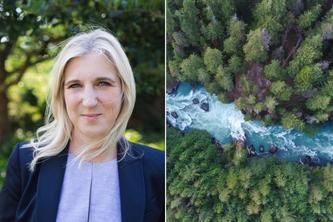
MINNEAPOLIS / ST. PAUL (12/08/2015)—University of Minnesota Regents Professor R. Lawrence Edwards in the College of Science and Engineering’s Department of Earth Sciences was elected as a foreign member of the Chinese Academy of Sciences for his excellence in original scientific research studying climate patterns, notably in China.
Edwards is among only 12 newly elected foreign members worldwide across all scientific disciplines. He is the first member of the Chinese Academy of Sciences from the University of Minnesota. Membership in the Chinese Academy of Sciences is China’s highest academic honor in scientific and technology fields. Membership is highly selective with only 82 foreign members across all scientific disciplines.
Edwards is known worldwide for his development of extremely precise methods for measuring the ages of rocks and how that relates to climate change. To determine the age of rocks, he uses the “uranium-thorium” (also called the “thorium-230”) dating method, in which he must detect incredibly small amounts of the elements uranium and thorium. He uses these methods to date rocks found in caves in China to document climate change patterns in history.
Edwards’ cave records of the last several centuries contain some of the strongest evidence yet for human-induced climate change. He is one of the most cited earth scientists in the world.
By also measuring the proportions of different forms of oxygen, he can tell how much rain fell at the time the rock was deposited. He and his research team have tracked the monsoons with great accuracy back 400,000 years, when Homo erectus, not Homo sapiens, inhabited the region.
Some of his research assesses the relationship between climate change and cultural history, drawing plausible links between global shifts in rainfall patterns and major cultural changes. For example, his cave records suggest that dry conditions contributed to the demise of the Tang, Yuan, and Ming Dynasties in China.
In other research, Edwards and his colleagues published research on a rock found in a Chinese cave that contained what was determined to be 80,000-year-old Homo sapiens fossils. In dating the rock, Edwards raised profound questions of whether modern humans could have made it across the vast expanse of Asia far earlier than suspected.
“Edwards’ research findings are groundbreaking. We are proud of his accomplishments and his election as a foreign member of the Chinese Academy of Sciences,” said Steven L. Crouch, dean of the University of Minnesota College of Science and Engineering. “Like many of our faculty, he is humble about his ongoing, cutting-edge research. We’re happy he’s in the spotlight with this honor.”
Edwards is also a Robert D. & Carol C. Gunn Professor and Distinguished McKnight University Professor at the University of Minnesota.
- Categories:
- Science and Technology





